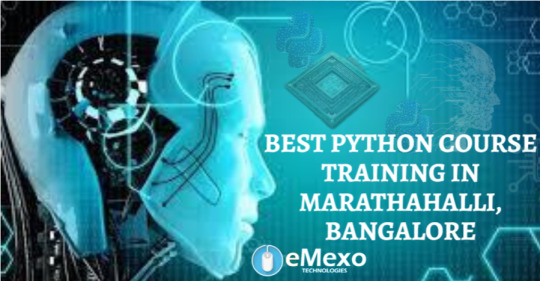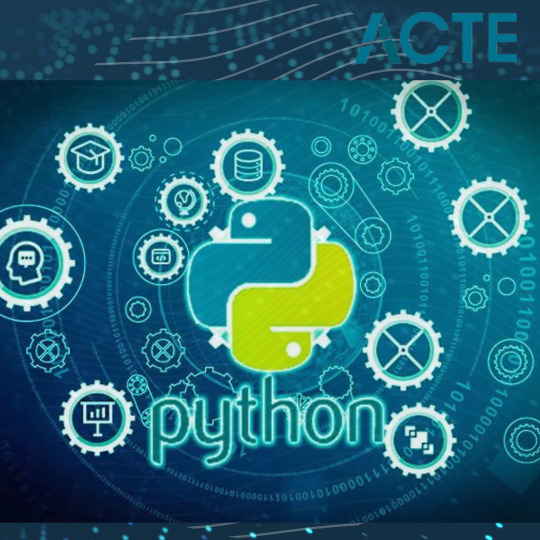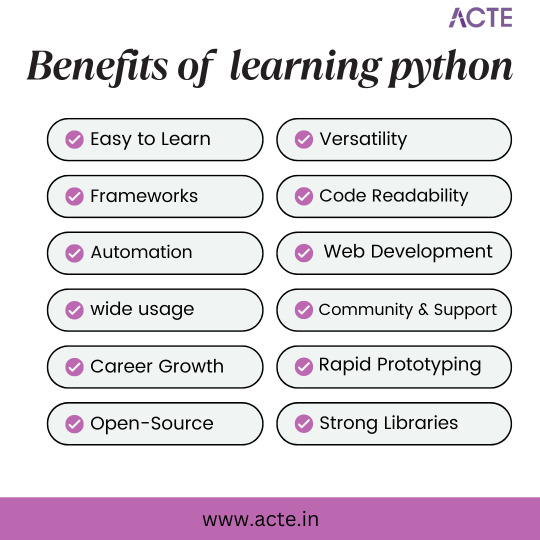#Django web development benefits
Explore tagged Tumblr posts
Text
ReactJS with Django: Why It's a Winning Combination for Developers: Find out why ReactJS paired with Django is the developer's choice. Explore the incredible benefits, seamless integration, and endless possibilities of this tech stack.
#ReactJS benefits#Django integration with ReactJS#Advantages of using ReactJS and Django#ReactJS in Django projects#Django web development benefits#Single-page applications with ReactJS
0 notes
Text
Best Python Training in Marathahalli, Bangalore – Become a Python Expert & Launch a Future-Ready Career!






youtube
Want to master Python programming and build a successful IT career? Join eMexo Technologies for the Best Python Training in Marathahalli, Bangalore – your path to becoming a skilled Python developer with job-ready skills and industry certification.
Our Python Certification Course in Marathahalli, Bangalore is designed to equip you with in-demand programming skills, whether you're a beginner or an experienced professional. With real-time projects, hands-on exercises, and expert mentorship, you’ll gain the confidence to build real-world applications and secure your dream job.
🌟 Who Should Join Our Python Course in Marathahalli, Bangalore?
This Python Course in Marathahalli, Bangalore is ideal for:
Students and freshers looking to start their programming career
Software developers and IT professionals upskilling in Python
Data analysts and automation testers using Python for scripting
Anyone looking to crack technical interviews or get Python certified
📘 What You’ll Learn in Our Python Certification Course Marathahalli, Bangalore:
Core Python Programming: Variables, data types, loops, functions, OOP concepts
Advanced Python Concepts: File handling, exception handling, modules, decorators
Web Development with Python: Introduction to Django/Flask frameworks
Database Integration: Using Python with MySQL and SQLite
Automation & Scripting: Build scripts for real-time problem-solving
Live Projects: Real-world applications like calculators, dashboards, and web apps
🚀 Why Choose eMexo Technologies for Python Training in Marathahalli, Bangalore?
We are more than just a Python Training Center in Marathahalli, Bangalore – we are your learning partner. Our focus is on providing career-oriented Python training through certified instructors, hands-on practice, and real-time case studies.
What Makes Us the Best Python Training Institute in Marathahalli, Bangalore:
✅ Industry-expert trainers with real-world Python experience ✅ Fully-equipped classrooms and interactive online sessions ✅ 100% practical-oriented training with live project support ✅ Personalized career guidance, resume building & mock interviews ✅ Dedicated Python training placement in Marathahalli, Bangalore
📅 Upcoming Python Training Batch Details:
Start Date: July 1st, 2025
Time: 10:00 AM IST
Location: eMexo Technologies, Marathahalli, Bangalore
Mode: Both Classroom & Online Training Available
👥 Who Can Benefit from This Python Training Marathahalli, Bangalore?
Students & fresh graduates planning to enter the IT sector
Working professionals aiming to switch to Python development
Testers, analysts, and engineers looking to automate workflows
Anyone passionate about coding and application development
🎯 Get Certified. Get Placed. Get Ahead.
Join the top-rated Python Training Institute in Marathahalli, Bangalore and open doors to careers in software development, automation, web development, and data science.
📞 Call or WhatsApp: +91-9513216462 📧 Email: [email protected] 🌐 Website: https://www.emexotechnologies.com/courses/python-training-in-marathahalli-bangalore/
🚀 Limited Seats Available – Enroll Today and Start Your Python Journey!
🔖 Hashtags:
#PythonTrainingInMarathahalliBangalore#PythonCertificationCourseInMarathahalliBangalore#PythonCourseInMarathahalliBangalore#PythonTrainingCenterInMarathahalliBangalore#PythonTrainingInstituteInMarathahalliBangalore#eMexoTechnologies#PythonProjects#PythonTrainingPlacementInMarathahalliBangalore#ITTrainingBangalore#PythonJobs#BestPythonTrainingInstituteInMarathahalliBangalore#LearnPython#PythonProgramming#PythonForBeginners#Youtube
2 notes
·
View notes
Text
Top Free Python Courses & Tutorials Online Training | NareshIT
Top Free Python Courses & Tutorials Online Training | NareshIT
In today’s tech-driven world, Python has emerged as one of the most versatile and popular programming languages. Whether you're a beginner or an experienced developer, learning Python opens doors to exciting opportunities in web development, data science, machine learning, and much more.
At NareshIT, we understand the importance of providing quality education. That’s why we offer free Python courses and tutorials to help you kick-start or advance your programming career. With expert instructors, hands-on training, and project-based learning, our Python online training ensures that you not only grasp the fundamentals but also gain real-world coding experience.
Why Choose NareshIT for Python Training?
Comprehensive Curriculum: We cover everything from Python basics to advanced concepts such as object-oriented programming, data structures, and frameworks like Django and Flask.
Expert Instructors: Our team of experienced instructors ensures that you receive the best guidance, whether you're learning Python from scratch or brushing up on advanced topics.
Project-Based Learning: Our free tutorials are not just theoretical; they are packed with real-life projects and assignments that make learning engaging and practical.
Flexible Learning: With our online format, you can access Python tutorials and training anytime, anywhere, and learn at your own pace.
Key Features of NareshIT Python Courses
Free Python Basics Tutorials: Get started with our easy-to-follow Python tutorials designed for beginners.
Advanced Python Concepts: Dive deeper into topics like file handling, exception handling, and working with APIs.
Hands-on Practice: Learn through live coding sessions, exercises, and project work.
Certification: Upon completion of the course, earn a certificate that adds value to your resume.
Who Can Benefit from Our Python Courses?
Students looking to gain a solid foundation in programming.
Professionals aiming to switch to a career in tech or data science.
Developers wanting to enhance their Python skills and explore new opportunities.
Enthusiasts who are passionate about learning a new skill.
Start Learning Python for Free
At NareshIT, we are committed to providing accessible education for everyone. That’s why our free Python courses are available online for anyone eager to learn. Whether you want to build your first Python program or become a pro at developing Python applications, we’ve got you covered.
Ready to Dive into Python?
Sign up for our free Python tutorials today and embark on your programming journey with NareshIT. With our structured courses and expert-led training, mastering Python has never been easier. Get started now, and unlock the door to a world of opportunities!

#python#pythontraining#freepythoncourse#onlinetraining#coding#pythontutorials#pythonforbeginners#programming#pythononline#learnpython#softwaretraining#freelearning#pythonprogramming#onlinetutorial#techtraining#pythoncourses#onlineeducation#pythoncode#codingforbeginners
2 notes
·
View notes
Text
Which is better full stack development or testing?

Full Stack Development vs Software Testing: Which Career Path is Right for You?
In today’s rapidly evolving IT industry, choosing the right career path can be challenging. Two popular options are Full Stack Development and Software Testing. Both of these fields offer unique opportunities and cater to different skill sets, making it essential to assess which one aligns better with your interests, goals, and long-term career aspirations.
At FirstBit Solutions, we take pride in offering a premium quality of teaching, with expert-led courses designed to provide real-world skills. Our goal is to help you know, no matter which path you choose. Whether you’re interested in development or testing, our 100% unlimited placement call guarantee ensures ample job opportunities. In this answer, we’ll explore both career paths to help you make an informed decision.
Understanding Full Stack Development
What is Full Stack Development?
Full Stack Development involves working on both the front-end (client-side) and back-end (server-side) of web applications. Full stack developers handle everything from designing the user interface (UI) to managing databases and server logic. They are versatile professionals who can oversee a project from start to finish.
Key Skills Required for Full Stack Development
To become a full stack developer, you need a diverse set of skills, including:
Front-End Technologies: HTML, CSS, and JavaScript are the fundamental building blocks of web development. Additionally, proficiency in front-end frameworks like React, Angular, or Vue.js is crucial for creating dynamic and responsive web interfaces.
Back-End Technologies: Understanding back-end programming languages like Node.js, Python, Ruby, Java, or PHP is essential for server-side development. Additionally, knowledge of frameworks like Express.js, Django, or Spring can help streamline development processes.
Databases: Full stack developers must know how to work with both SQL (e.g., MySQL, PostgreSQL) and NoSQL (e.g., MongoDB) databases.
Version Control and Collaboration: Proficiency in tools like Git, GitHub, and agile methodologies is important for working in a collaborative environment.
Job Opportunities in Full Stack Development
Full stack developers are in high demand due to their versatility. Companies often prefer professionals who can handle both front-end and back-end tasks, making them valuable assets in any development team. Full stack developers can work in:
Web Development
Mobile App Development
Enterprise Solutions
Startup Ecosystems
The flexibility to work on multiple layers of development opens doors to various career opportunities. Moreover, the continuous rise of startups and digital transformation initiatives has further fueled the demand for full stack developers.
Benefits of Choosing Full Stack Development
High Demand: The need for full stack developers is constantly increasing across industries, making it a lucrative career choice.
Versatility: You can switch between front-end and back-end tasks, giving you a holistic understanding of how applications work.
Creativity: If you enjoy creating visually appealing interfaces while also solving complex back-end problems, full stack development allows you to engage both creative and logical thinking.
Salary: Full stack developers typically enjoy competitive salaries due to their wide skill set and ability to handle various tasks.
Understanding Software Testing
What is Software Testing?
Software Testing is the process of evaluating and verifying that a software product or application is free of defects, meets specified requirements, and functions as expected. Testers ensure the quality and reliability of software by conducting both manual and automated tests.
Key Skills Required for Software Testing
To succeed in software testing, you need to develop the following skills:
Manual Testing: Knowledge of testing techniques, understanding different testing types (unit, integration, system, UAT, etc.), and the ability to write test cases are fundamental for manual testing.
Automated Testing: Proficiency in tools like Selenium, JUnit, TestNG, or Cucumber is essential for automating repetitive test scenarios and improving efficiency.
Attention to Detail: Testers must have a keen eye for identifying potential issues, bugs, and vulnerabilities in software systems.
Scripting Knowledge: Basic programming skills in languages like Java, Python, or JavaScript are necessary to write and maintain test scripts for automated testing.
Job Opportunities in Software Testing
As the demand for high-quality software increases, so does the need for skilled software testers. Companies are investing heavily in testing to ensure that their products perform optimally in the competitive market. Software testers can work in:
Manual Testing
Automated Testing
Quality Assurance (QA) Engineering
Test Automation Development
With the rise of Agile and DevOps methodologies, the role of testers has become even more critical. Continuous integration and continuous delivery (CI/CD) pipelines rely on automated testing to deliver reliable software faster.
Benefits of Choosing Software Testing
Job Security: With software quality being paramount, skilled testers are in high demand, and the need for testing professionals will only continue to grow.
Quality Assurance: If you have a knack for perfection and enjoy ensuring that software works flawlessly, testing could be a satisfying career.
Automated Testing Growth: The shift toward automation opens up new opportunities for testers to specialize in test automation tools and frameworks, which are essential for faster releases.
Flexibility: Testing provides opportunities to work across different domains and industries, as almost every software product requires thorough testing.
Full Stack Development vs Software Testing: A Comparative Analysis
Let’s break down the major factors that could influence your decision:
Factors
Full Stack Development
Software Testing
Skills
Proficiency in front-end and back-end technologies, databases
Manual and automated testing, attention to detail, scripting
Creativity
High – involves creating and designing both UI and logic
Moderate – focuses on improving software through testing and validation
Job Roles
Web Developer, Full Stack Engineer, Mobile App Developer
QA Engineer, Test Automation Engineer, Software Tester
Career Growth
Opportunities to transition into senior roles like CTO or Solution Architect
Growth towards roles in automation and quality management
Salary
Competitive with wide-ranging opportunities
Competitive, with automation testers in higher demand
Demand
High demand due to increasing digitalization and web-based applications
Consistently high, especially in Agile/DevOps environments
Learning Curve
Steep – requires mastering multiple languages and technologies
Moderate – requires a focus on testing tools, techniques, and automation
Why Choose FirstBit Solutions for Full Stack Development or Software Testing?
At FirstBit Solutions, we provide comprehensive training in both full stack development and software testing. Our experienced faculty ensures that you gain hands-on experience and practical knowledge in the field of your choice. Our 100% unlimited placement call guarantee ensures that you have ample opportunities to land your dream job, no matter which course you pursue. Here’s why FirstBit is your ideal training partner:
Expert Trainers: Learn from industry veterans with years of experience in development and testing.
Real-World Projects: Work on real-world projects that simulate industry scenarios, providing you with the practical experience needed to excel.
Job Assistance: Our robust placement support ensures you have access to job openings with top companies.
Flexible Learning: Choose from online and offline batch options to fit your schedule.
Conclusion: Which Career Path is Right for You?
Ultimately, the choice between full stack development and software testing comes down to your personal interests, skills, and career aspirations. If you’re someone who enjoys building applications from the ground up, full stack development might be the perfect fit for you. On the other hand, if you take satisfaction in ensuring that software is of the highest quality, software testing could be your calling.
At FirstBit Solutions, we provide top-notch training in both fields, allowing you to pursue your passion and build a successful career in the IT industry. With our industry-aligned curriculum, expert guidance, and 100% placement call guarantee, your future is in good hands.
So, what are you waiting for? Choose the course that excites you and start your journey toward a rewarding career today!
#education#programming#tech#technology#training#python#full stack developer#software testing#itservices#java#.net#.net developers#datascience
2 notes
·
View notes
Text
Exploring the Python and Its Incredible Benefits:
Python, a versatile programming language known for its simplicity and adaptability, holds a prominent position in the technological landscape. Originating in the late 1980s, Python has garnered substantial attention due to its user-friendly syntax, making it an accessible choice for individuals at all levels of programming expertise. Notably, Python's design principles prioritize code clarity, empowering developers to articulate their ideas effectively and devise elegant solutions.

Python's applicability spans a multitude of domains, encompassing web development, data analysis, artificial intelligence, and scientific computing, among others. Its rich array of libraries and frameworks enhances efficiency in diverse tasks, including crafting dynamic websites, automating routine processes, processing and interpreting data, and constructing intricate applications.
The confluence of Python's flexibility and robust community support has driven its widespread adoption across varied industries. Whether one is a newcomer or an accomplished programmer, Python constitutes a potent toolset for software development and systematic problem-solving.
The ensuing enumeration underscores the merits of acquainting oneself with Python:

Accessible Learning: Python's straightforward syntax expedites the learning curve, enabling a focus on logical problem-solving rather than grappling with intricate language intricacies.
Versatility in Application: Python's versatility finds expression in applications spanning web development, data analysis, AI, and more, cultivating diverse avenues for career exploration.
Data Insight and Analysis: Python's specialized libraries, such as NumPy and Pandas, empower adept data analysis and visualization, enhancing data-driven decision-making.
AI and Machine Learning Proficiency: Python's repository of libraries, including Scikit-Learn, empowers the creation of sophisticated algorithms and AI models.
Web Development Prowess: Python's frameworks, notably Django, facilitate the swift development of dynamic, secure web applications, underscoring its relevance in modern web environments.
Efficient Prototyping: Python's agile development capabilities facilitate the rapid creation of prototypes and experimental models, fostering innovation.
Community Collaboration: The dynamic Python community serves as a wellspring of resources and support, nurturing an environment of continuous learning and problem resolution.
Varied Career Prospects: Proficiency in Python translates to an array of roles across diverse sectors, reflecting the expanding demand for skilled practitioners.
Cross-Disciplinary Impact: Python's adaptability transcends industries, permeating sectors such as finance, healthcare, e-commerce, and scientific research.
Open-Source Advantage: Python's open-source nature encourages collaboration, fostering ongoing refinement and communal contribution.
Robust Toolset: Python's toolkit simplifies complex tasks and accelerates development, enhancing productivity.
Code Elegance: Python's elegant syntax fosters code legibility, promoting teamwork and fostering shared comprehension.
Professional Advancement: Proficiency in Python translates into promising career advancement opportunities and the potential for competitive compensation.
Future-Proofed Skills: Python's enduring prevalence and versatile utility ensure that acquired skills remain pertinent within evolving technological landscapes.
In summation, Python's stature as a versatile, user-friendly programming language stands as a testament to its enduring relevance. Its impact is palpable across industries, driving innovation and technological progress.
If you want to learn more about Python, feel free to contact ACTE Institution because they offer certifications and job opportunities. Experienced teachers can help you learn better. You can find these services both online and offline. Take things step by step and consider enrolling in a course if you’re interested.
10 notes
·
View notes
Text
python training london
python training london
what is python programmingWelcome to the captivating world of Python programming! If you've ever been curious about coding or are looking to enhance your skills, then you're in the right place. Whether you're a beginner eager to dip your toes into the vast ocean of programming or an experienced developer seeking to expand your repertoire, Python has something incredible in store for everyone.
In this blog post, we'll explore everything there is to know about Python - from its origins and benefits, to what makes it such a popular language among programmers worldwide. So grab your favorite beverage and get ready to embark on an exhilarating journey into the realm of Python programming. Let's dive in!
What is Python?Python is a high-level, interpreted programming language that was created by Guido van Rossum and first released in 1991. Known for its simplicity and readability, Python has gained immense popularity among programmers of all levels. It supports multiple programming paradigms, including object-oriented, procedural, and functional programming.
One of the standout features of Python is its clean and elegant syntax. With minimalistic code structure, developers can write concise programs that are easy to understand and maintain. The language also boasts a vast standard library that provides ready-to-use modules for various tasks such as file handling, networking operations, database access, and more.
Python's versatility extends beyond traditional software development. It finds application in areas like web development using frameworks like Django or Flask, data analysis with libraries like pandas or NumPy, machine learning through scikit-learn or TensorFlow - just to scratch the surface.
Furthermore, Python's cross-platform compatibility allows you to run your code seamlessly on different operating systems such as Windows, macOS, Linux without any modifications. This flexibility makes it an ideal choice for building applications across diverse environments.
Whether you're creating simple scripts or complex applications/systems from scratch – Python offers an extensive range of tools and resources to make your coding experience smooth sailing. Its vast community support ensures that you'll never be short on help when facing challenges along the way.
In summary (not conclusive), Python is a dynamic programming language loved by beginners and professionals alike due to its simplicity yet powerful capabilities across various domains – making it an essential tool in every programmer's arsenal.
2 notes
·
View notes
Text
How Can a Python Programming Certificate Enhance Your Career Prospects?

Introduction
In today’s digital-first world, programming is more than just a technical skill it’s a powerful career accelerator. Python, a beginner-friendly and widely-used language, remains one of the most in-demand programming languages across industries. But simply knowing Python isn’t enough. That’s where a Python programming certificate from a Python online training with certification steps in to validate your expertise and give you a competitive edge.
Whether you're a beginner, a student, or a working professional considering a career switch, earning a Python certificate can significantly improve your job prospects. Enrolling in a structured python training for beginners program helps you build a solid foundation, practice hands-on coding, and become job-ready faster. Let’s explore how.
What Is a Python Programming Certificate?
A Python programming certificate is a formal recognition that you have successfully completed a structured learning program covering the core and advanced aspects of Python. This certificate is often awarded by training institutions, universities, or online platforms offering Python online training with certification.
Types of Python Certificates
Beginner-Level Certificate (Covers basics like syntax, loops, data structures)
Advanced Certificate (Includes modules on OOP, data analysis, web development, etc.)
Specialized Certificate (Focuses on specific domains like Machine Learning, Data Science, Automation)
Key Benefits of Python Online Training With Certification
Structured Learning Path
Python training courses offer a well-organized curriculum that helps learners move from basic to advanced levels efficiently.
Practical Skill Development
Courses often include:
Real-world projects
Live coding sessions
Peer collaboration
Quizzes and assignments
Verified Credential
A certificate serves as proof of your skills and knowledge, which can be showcased on your resume, LinkedIn, or during interviews.
Career Advancement
Many recruiters filter applicants based on certifications, especially for junior or entry-level positions. This gives certified professionals a direct advantage.
Industry Demand and Salary Trends
Python in High Demand
According to Stack Overflow and TIOBE Index reports, Python consistently ranks as one of the top programming languages globally.
Salary Insights
Entry-Level Python Developer: $70,000 - $90,000 annually
Data Analyst with Python: $60,000 - $85,000
Machine Learning Engineer: $110,000 - $160,000
(Glassdoor, Payscale, and Indeed data as of 2025)
Job Openings
Popular job boards list thousands of active openings for roles requiring Python certification.
Real-World Applications and Job Roles
Python is used in a wide range of domains. Here's how a certificate aligns you with various roles:
Industry
Job Role
Skills Covered in Certified Course
Data Science
Data Analyst, Data Scientist
NumPy, Pandas, Matplotlib, Seaborn
Web Development
Backend Developer
Flask, Django, API creation
Automation
QA Tester, Automation Engineer
Selenium, PyTest, scripting
Finance
Quant Analyst, Risk Analyst
Data visualization, predictive analytics
Healthcare
Bioinformatics Specialist
Data cleaning, modeling, visualization
Case Studies: Success Stories From Certified Professionals
Case Study 1: Career Switch From Teaching to Tech
Ramesh, a school teacher from Bangalore, completed a 3-month Python online training with certification. He is now working as a Junior Python Developer at a fintech startup.
Case Study 2: Upskilling for Promotion
Anita, a data entry analyst, used her certificate to move into a data analyst role within her company. The practical exercises in her course gave her the confidence to handle real projects.
What You Learn in a Certified Python Course
A comprehensive course equips you with both foundational and domain-specific skills:
Core Python Topics
Variables, data types, and operators
Control structures: if, for, while
Functions and modules
File handling
Advanced Modules
Object-Oriented Programming
Regular Expressions
Exception Handling
Working with Databases
Domain-Specific Skills
Web Development with Flask/Django
Data Analysis with Pandas and NumPy
Visualization using Matplotlib and Seaborn
Basic Machine Learning with Scikit-learn
Hands-On Elements
# Sample Python Code: Data Filtering with Pandas
import pandas as pd
# Load a dataset
df = pd.read_csv('sales_data.csv')
# Filter sales greater than 5000
high_sales = df[df['amount'] > 5000]
print(high_sales)
How Certification Builds Confidence and Credibility
Recognition by Employers
Having a certificate Python programming tag on your resume signals that you're committed to learning and growing professionally.
Boosts Self-Belief
Completing projects, solving assignments, and passing assessments build the self-confidence needed to apply for competitive roles.
Enhances Networking
Certified programs often include community support, discussion forums, and peer groups great for networking and job leads.
Step-by-Step Guide to Earning Your Certificate
Choose a Reputed Course
Look for programs that offer Python online training with certification. Ensure they include projects, assessments, and post-completion support.
Set a Learning Schedule
Stick to a routine. Most online courses are self-paced, but consistency is key.
Complete Assignments and Projects
Practice is vital. Use GitHub to host your projects and build a portfolio.
Pass the Final Assessment
Many platforms conduct a final quiz or project evaluation to award the certificate.
Showcase Your Certificate
Update your LinkedIn profile, resume, and professional portfolio.
Long-Term Career Benefits
Career Switch
If you're switching from a non-tech background, Python certification offers a low-barrier, high-impact entry into IT.
Freelancing and Entrepreneurship
With certified skills, you can explore freelance opportunities or build your own web apps, tools, and automation scripts.
Continual Learning
Once certified, you can move on to advanced topics like Machine Learning, AI, or Cloud Integration.
Global Recognition
Python certificates from top platforms are recognized internationally, helping you apply for jobs worldwide.
Conclusion
A Python programming certificate does more than just validate your technical skills—it unlocks doors to new roles, better pay, and greater job satisfaction. In 2025 and beyond, as automation, data science, and AI continue to evolve, certified Python professionals will remain in high demand. Whether you're transitioning into tech, enhancing your current skill set, or aiming for a promotion, a Python training course offers the structured learning, expert guidance, and hands-on experience you need to thrive.
With a well-designed course, you gain practical exposure to real-world projects, problem-solving techniques, and the latest Python libraries used in the industry. Employers today look for professionals who can hit the ground running, and a certificate ensures you're seen as job-ready. If you're serious about launching or boosting your tech career, enrolling in a Python online training with certification is a smart, future-proof move. Start your journey today earn your certificate, build real-world skills, and open new doors in your career!
0 notes
Text
Unlock Your Programming Potential with Python Training at Magnitia
In today’s fast-evolving tech landscape, mastering Python has become more than just a skill—it’s a gateway to numerous career opportunities in software development, data science, automation, artificial intelligence, and more. At Magnitia, our Python Training course is designed to transform learners from beginners to industry-ready professionals, equipping them with both foundational knowledge and practical experience.
Why Choose Python?
Python is known for its simplicity, versatility, and powerful libraries. Whether you're developing web applications, analyzing data, automating tasks, or venturing into machine learning, Python offers the flexibility and efficiency that modern developers and organizations demand. Its readability and vast community support make it the first choice for professionals and students alike.
About the Python Training at Magnitia
Magnitia’s Python Training Program is carefully curated to suit aspiring developers, fresh graduates, and working professionals. With hands-on training, real-time projects, and guidance from experienced instructors, you gain deep insight into how Python is used in real-world applications.
Course Highlights:
Comprehensive Curriculum: Covers basic syntax, data structures, object-oriented programming, file handling, error management, modules, libraries (NumPy, Pandas, etc.), and web frameworks like Django or Flask.
Live Projects: Apply what you learn through practical assignments and capstone projects to build a solid portfolio.
Expert Mentors: Learn from industry veterans who bring practical experience and best practices into every session.
Job Assistance: Benefit from resume building, mock interviews, and job placement support.
Who Can Join?
Whether you’re a complete beginner or looking to advance your programming skills, this course is ideal for:
Students and fresh graduates
IT professionals seeking to shift into Python development
Data enthusiasts aiming to break into data science or analytics
Entrepreneurs and freelancers wanting to build robust applications
What You’ll Learn:
Python fundamentals and best coding practices
Advanced data handling and database integration
Automation scripting and real-time application development
Frameworks for web development and RESTful API design
An introduction to data visualization and analytics using Python
Why Magnitia?
With a proven track record of successful learners and industry partnerships, Magnitia provides an enriching learning environment tailored to your success. Our focus on project-based learning, expert mentorship, and career advancement makes us a top choice for Python training in the industry.
Ready to Take the Next Step in Your Programming Career? Enroll in Magnitia’s Python Training today and pave your way to a rewarding future in tech.
0 notes
Text
Top Python Full Stack Certifications to Boost Your Career
In today’s rapidly evolving tech landscape, mastering Python full stack development is a smart move for both beginners and professionals. Many learners at the best software training institute in Hyderabad start their journey with certification programs that not only build practical skills but also boost professional credibility. Certifications are more than just proof of knowledge—they open doors to better jobs, higher salaries, and long-term career growth.
1. Python Full Stack Developer Certification – Simplilearn
This industry-aligned program is designed to cover the complete Python full stack journey, from client-side design to server-side scripting.
What You'll Gain:
HTML, CSS, JavaScript, and React for frontend
Python, Django, and RESTful APIs for backend
Database interaction and deployment skills
Why It Matters:
This certification focuses on real-world project building, making it ideal for developers who want to build a portfolio while learning.
2. Professional Certificate in Full Stack Web Development with Python – edX (by IBM)
This professional track, offered by IBM, walks you through building web apps using Python and modern tools.
What You'll Learn:
Full stack development using Flask and Node.js
Frontend technologies like Bootstrap and React
Working with Git, Docker, and CI/CD pipelines
Why It’s Popular:
It includes guided projects and is backed by a global tech leader, making your resume stand out to recruiters.
3. Advanced Python Programming and Full Stack Training – Coursera (UMich)
Offered by the University of Michigan, this course focuses on deeper backend development, ideal for those who already understand the basics.
Core Modules:
Python for web and database development
REST APIs and data handling
Project work with version control systems
Value Addition:
A certificate from a prestigious university boosts your career credibility and shows academic rigor.
4. Python Web Developer Bootcamp – Udemy
Udemy's bootcamp is a hands-on, project-based course ideal for fast-paced learners who want practical exposure.
Highlights:
Covers both frontend and backend frameworks
Includes complete projects and deployment walkthroughs
Lifetime access with community support
Why It Works:
It’s cost-effective and perfect for learners who prefer flexible learning with real coding assignments.
5. Coursera - Google IT Automation with Python
Although not a traditional full stack certification, it’s excellent for backend automation and system integration.
Benefits:
Focuses on automation, APIs, and Python scripting
Prepares you for backend-heavy roles
Certificate by Google, a globally respected name
Great For:
Developers interested in combining backend logic with DevOps and automation roles.
Conclusion
Python full stack certifications help bridge the gap between theory and real-world development. As hiring standards evolve, certified skills are becoming essential to land competitive jobs. To get hands-on training and guided certification prep, trust SSSIT Computer Education—the leading destination for future-ready developers. Our expert faculty, project-based curriculum, and placement support make us your top choice for mastering Python full stack development.
#best python training in hyderabad#best python training in kukatpally#best python training in KPHB#Best python training institute in Hyderabad
0 notes
Text
Hire Dedicated Python Developers
When it comes to building robust, scalable, and efficient web or software solutions, Python remains one of the most preferred programming languages. Businesses seeking to streamline their development processes often choose to hire dedicated Python developers for their projects. These professionals bring in-depth knowledge of Python frameworks such as Django, Flask, and FastAPI, ensuring the delivery of clean and maintainable code. By hiring dedicated experts, companies gain the flexibility to scale their teams as needed, reduce time-to-market, and maintain better control over the development lifecycle.
A dedicated developer works exclusively on your project, aligning closely with your goals, timelines, and expectations. Whether you're launching a startup, upgrading an existing application, or integrating AI and machine learning functionalities, dedicated Python developers offer the technical expertise and agility to meet your demands. Additionally, this hiring model supports cost efficiency, especially for long-term or complex development tasks. Choosing to hire developers on a dedicated basis allows for improved communication, better collaboration, and enhanced productivity. It ensures that your software solution benefits from continuous improvements and proactive problem-solving. Opting to hire dedicated Python developers can be a strategic move that empowers your organization to innovate faster and deliver high-quality digital products
0 notes
Text
Learning Full Stack Development: A Journey from Frontend to Backend
In the ever evolving world of technology, full stack development has emerged as one of the most in demand and versatile skill sets in the software industry. Whether you're a beginner stepping into the coding universe or an experienced developer looking to broaden your horizon, learning Full Stack Development Online can be a game changer. This blog post will guide you through what it means to be a full stack developer, why it's valuable, and how to start your journey effectively.

What is Full Stack Development?
Full stack development refers to the ability to work on both the frontend (client-side) and backend (server-side) of a web application. A full stack developer is someone who can manage the entire development process from designing user interfaces to handling databases and server logic.
Frontend: Everything the user interacts with HTML, CSS, JavaScript, frameworks like React or Angular.
Backend: Everything behind the scenes server logic, databases, APIs, and authentication using languages like Node.js, Python, Java, or PHP.
Why Learn Full Stack Development?
High Demand: Companies value developers who can handle multiple aspects of development.
Better Problem Solving: Understanding both sides helps you debug and improve applications more efficiently.
More Opportunities: Freelancing, startups, or product building all benefit from full stack skills.
Autonomy: Build complete apps by yourself without relying on multiple specialists.
Higher Earning Potential: Multi-skilled developers often command higher salaries.
Skills You Need to Master
Here’s a breakdown of core skills needed for a full stack developer to study in a well reputed Software Training Institutes:
Frontend:
HTML, CSS, JavaScript: The building blocks of any website.
Frameworks: React.js, Vue.js, or Angular.
Responsive Design: Making websites mobile-friendly using CSS frameworks like Bootstrap or Tailwind CSS.
Backend:
Languages: Node.js, Python (Django/Flask), Ruby, Java, or PHP.
Databases: MySQL, PostgreSQL, MongoDB.
APIs: RESTful and GraphQL.
Authentication & Security: JWT, OAuth, HTTPS.
Tools & Platforms:
Version Control: Git and GitHub.
Deployment: Heroku, Vercel, Netlify, AWS, or Digital Ocean.
CI/CD & Testing: Basic knowledge of pipelines and automated testing.
How to Start Learning Full Stack Development

Pick a Language Stack: For beginners, the MERN stack (MongoDB, Express, React, Node.js) is a popular and well-supported option.
Follow a Roadmap: Stick to a structured learning plan. Many websites like roadmap.sh offer visual guides.
Build Projects: Start simple (to-do list, portfolio website) and gradually work on more complex applications like blogs, chat apps, or e-commerce platforms.
Use Online Resources: Leverage free and paid courses on platforms like free Code Camp, Udemy, Coursera, and YouTube.
Join Communities: Participate in developer communities on GitHub, Reddit, or Discord to get feedback and stay motivated.
Tips for Staying on Track
Be patient: Full stack development takes time. Don’t rush.
Practice consistently: Code every day, even for a short time.
Document your journey: Start a blog or GitHub repo to share your progress and projects.
Stay updated: Web development technologies evolve. Follow tech blogs, newsletters, and changelogs.
Final Thoughts
Learning full stack development is an investment in your future as a developer. It empowers you to understand the bigger picture of software development and opens doors to a wide range of career opportunities. Start small, be consistent, and enjoy the process before you know it, you'll be building fully functional web apps from scratch.
0 notes
Text
Top Programming Languages to Learn for Freelancing in India

The gig economy in India is blazing a trail and so is the demand for skilled programmers and developers. Among the biggest plus points for freelancing work is huge flexibility, independence, and money-making potential, which makes many techies go for it as a career option. However, with the endless list of languages available to choose from, which ones should you master to thrive as a freelance developer in India?
Deciding on the language is of paramount importance because at the end of the day, it needs to get you clients, lucrative projects that pay well, and the foundation for your complete freelance career. Here is a list of some of the top programming languages to learn for freelancing in India along with their market demand, types of projects, and earning potential.
Why Freelance Programming is a Smart Career Choice
Let's lay out really fast the benefits of freelance programmer in India before the languages:
Flexibility: Work from any place, on the hours you choose, and with the workload of your preference.
Diverse Projects: Different industries and technologies put your skills to test.
Increased Earning Potential: When most people make the shift toward freelancing, they rapidly find that the rates offered often surpass customary salaries-with growing experience.
Skill Growth: New learning keeps on taking place in terms of new technology and problem-solving.
Autonomy: Your own person and the evolution of your brand.
Top Programming Languages for Freelancing in India:
Python:
Why it's great for freelancing: Python's versatility is its superpower. It's used for web development (Django, Flask), data science, machine learning, AI, scripting, automation, and even basic game development. This wide range of applications means a vast pool of freelance projects. Clients often seek Python developers for data analysis, building custom scripts, or developing backend APIs.
Freelance Project Examples: Data cleaning scripts, AI model integration, web scraping, custom automation tools, backend for web/mobile apps.
JavaScript (with Frameworks like React, Angular, Node.js):
Why it's great for freelancing: JavaScript is indispensable for web development. As the language of the internet, it allows you to build interactive front-end interfaces (React, Angular, Vue.js) and powerful back-end servers (Node.js). Full-stack JavaScript developers are in exceptionally high demand.
Freelance Project Examples: Interactive websites, single-page applications (SPAs), e-commerce platforms, custom web tools, APIs.
PHP (with Frameworks like Laravel, WordPress):
Why it's great for freelancing: While newer languages emerge, PHP continues to power a significant portion of the web, including WordPress – which dominates the CMS market. Knowledge of PHP, especially with frameworks like Laravel or Symfony, opens up a massive market for website development, customization, and maintenance.
Freelance Project Examples: WordPress theme/plugin development, custom CMS solutions, e-commerce site development, existing website maintenance.
Java:
Why it's great for freelancing: Java is a powerhouse for enterprise-level applications, Android mobile app development, and large-scale backend systems. Many established businesses and startups require Java expertise for robust, scalable solutions.
Freelance Project Examples: Android app development, enterprise software development, backend API development, migration projects.
SQL (Structured Query Language):
Why it's great for freelancing: While not a full-fledged programming language for building applications, SQL is the language of databases, and almost every application relies on one. Freelancers proficient in SQL can offer services in database design, optimization, data extraction, and reporting. It often complements other languages.
Freelance Project Examples: Database design and optimization, custom report generation, data migration, data cleaning for analytics projects.
Swift/Kotlin (for Mobile Development):
Why it's great for freelancing: With the explosive growth of smartphone usage, mobile app development remains a goldmine for freelancers. Swift is for iOS (Apple) apps, and Kotlin is primarily for Android. Specializing in one or both can carve out a lucrative niche.
Freelance Project Examples: Custom mobile applications for businesses, utility apps, game development, app maintenance and updates.
How to Choose Your First Freelance Language:
Consider Your Interests: What kind of projects excite you? Web, mobile, data, or something else?
Research Market Demand: Look at popular freelance platforms (Upwork, Fiverr, Freelancer.in) for the types of projects most requested in India.
Start with a Beginner-Friendly Language: Python or JavaScript is an excellent start due to their immense resources and helpful communities.
Focus on a Niche: Instead of trying to learn everything, go extremely deep on one or two languages within a domain (e.g., Python for data science, JavaScript for MERN stack development).
To be a successful freelance programmer in India, technical skills have to be combined with powerful communication, project management, and self-discipline. By mastering either one or all of these top programming languages, you will be set to seize exciting opportunities and project yourself as an independent professional in the ever-evolving digital domain.
Contact us
Location: Bopal & Iskcon-Ambli in Ahmedabad, Gujarat
Call now on +91 9825618292
Visit Our Website: http://tccicomputercoaching.com/
#Freelance Programming#Freelance India#Programming Languages#Coding for Freelancers#Learn to Code#Python#JavaScript#Java#PHP#SQL#Mobile Development#Freelance Developer#TCCI Computer Coaching
0 notes
Text
Best Software Training Institute in Hyderabad – Monopoly ITSolutions
Best Software Training Institute in Hyderabad – Monopoly ITSolutions
Best Software Training Institute in Hyderabad, Kukatpally, KPHB
In today’s competitive job market, having the right technical skills is essential for launching a successful IT career. The Best Software Training Institute in Hyderabad, Kukatpally, KPHB offers a wide range of career-focused courses designed to equip students with real-time project experience and job-ready expertise. Whether you're a beginner or a professional looking to upskill, choosing the right institute in Kukatpally can make a significant difference in your career path.
Comprehensive Course Offerings
The best software training institutes in Kukatpally offer a robust lineup of technology courses that are constantly updated with the latest industry trends. Here are the top programs offered:
.NET Full Stack Development
This course covers everything from front-end to back-end using Microsoft technologies.You will learn C#, ASP.NET MVC, Web API, ADO.NET, and SQL Server. The program also includes front-end tools like HTML5, CSS3, JavaScript, Bootstrap, and Angular. Students will build real-world enterprise-level applications, preparing them for roles in both product-based and service-based companies.
Java Full Stack Development
Java remains a staple in enterprise application development. This full stack course covers Core Java, OOPs, Collections, JDBC, Servlets, JSP, and frameworks like Spring, Spring Boot, and Hibernate. On the front end, you’ll learn Angular or React to complete your stack. Real-time project building and deployment on servers will give you hands-on experience.
Python with Django
Both beginners and professionals enjoy Python's simplicity and flexibility. This course starts with Python basics, data structures, and object-oriented programming, then advances into Django, RESTful APIs, MySQL/PostgreSQL integration, and deployment. It is ideal for those who are interested in web development or want to prepare for a career in data science.
Angular
The Angular framework allows you to build single-page applications (SPAs) that are scalable. Learn TypeScript, component-based architecture, services, HTTP client, reactive forms, routing, and third-party library integrations. The course includes building dynamic dashboards and enterprise apps using RESTful APIs and backend integration.
React
React is widely used for developing fast, interactive user interfaces. This course includes JSX, props, state management, lifecycle methods, Hooks, Context API, Redux, and routing. Students will also work on component-based architecture and build complete web apps with real API integration. React is especially important for those aiming to work in front-end development or MERN stack.
Data Science
A professional looking to transition into analytics or artificial intelligence can benefit from this specialized course.The curriculum includes Python for data analysis, NumPy, Pandas, Matplotlib, Seaborn, statistics, machine learning algorithms, data preprocessing, model evaluation, and deployment. Tools like Jupyter Notebook, Scikit-learn, and TensorFlow are introduced through real-life case studies.
Key Features of the Institute
Industry-Experienced Trainers: Learn from certified professionals with hands-on experience in top IT companies.
Real-Time Projects: Gain practical experience by working on real-world case studies and applications.
Resume & Interview Support: Resume building sessions, mock interviews, and HR support to help you crack job opportunities.
Student Success and Placement Support
Leading training institutes in Kukatpally not only focus on technical knowledge but also prepare students for real job scenarios. From interview preparation to placement drives, students receive complete career support. Many have secured jobs in top MNCs and IT startups after completing their training.
Conclusion
Making the right choice when it comes to software training is crucial to shaping your career in IT. If you’re ready to build expertise in technologies like .NET, Java, Python, Angular, React, and Data Science, look no further than Monopoly IT Solutions. Located in the heart of Kukatpally, we are committed to transforming learners into skilled professionals ready for today’s digital world.
#DotNet training#Job training institute in hyderabad#Software training in KPHB#Job training in JNTU Kukatpally
0 notes
Text
What is Django for beginners.
What is Django for Beginners?
Django is a high-level web framework for Python that encourages rapid development and clean, pragmatic design. It was created to help developers build web applications quickly and efficiently, allowing them to focus on writing code rather than dealing with the complexities of web development. For beginners, Django offers a powerful yet accessible way to learn the fundamentals of web development while building real-world applications.
Understanding Django
At its core, Django is designed to simplify the process of building web applications. It follows the Model-View-Template (MVT) architectural pattern, which separates the application into three interconnected components:
Model: This component handles the data and business logic. It defines the structure of the data, including the fields and behaviors of the data you’re storing. In Django, models are defined as Python classes, and they interact with the database to create, read, update, and delete records.
View: The view is responsible for processing user requests and returning the appropriate response. It acts as a bridge between the model and the template, retrieving data from the model and passing it to the template for rendering.
Template: Templates are used to define the presentation layer of the application. They are HTML files that can include dynamic content generated by the view. Django’s templating engine allows you to create reusable components and maintain a clean separation between the presentation and business logic.
Key Features of Django
Django comes with a plethora of features that make it an excellent choice for beginners:
Batteries Included: Django is often described as a "batteries-included" framework because it comes with a wide range of built-in features. This includes an admin panel, user authentication, form handling, and security features, which means you can get started quickly without needing to install additional packages.
Robust Security: Security is a top priority in Django. The framework provides built-in protections against common web vulnerabilities such as SQL injection, cross-site scripting (XSS), and cross-site request forgery (CSRF). This allows beginners to focus on building their applications without worrying about security issues.
Scalability: Django is designed to handle high-traffic applications. Its architecture allows for easy scaling, making it suitable for both small projects and large-scale applications. As your application grows, Django can accommodate increased traffic and data without significant changes to the codebase.
Versatile Database Support: Django supports multiple database backends, including SQLite, PostgreSQL, MySQL, and Oracle. This flexibility allows beginners to choose the database that best fits their needs and easily switch between them if necessary.
Strong Community and Documentation: Django has a large and active community, which means there are plenty of resources available for beginners. The official documentation is comprehensive and well-structured, making it easy to find information and learn how to use the framework effectively.
Benefits of Using Django for Beginners
Ease of Learning: Django’s clear and consistent design makes it easy for beginners to grasp the concepts of web development. The framework’s use of Python, a language known for its readability and simplicity, further lowers the barrier to entry.
Rapid Development: With Django, you can quickly build and deploy web applications. The framework’s built-in features and tools streamline the development process, allowing you to focus on writing code rather than dealing with repetitive tasks.
Community Support: As a beginner, having access to a supportive community can be invaluable. Django’s community is welcoming and offers numerous tutorials, forums, and resources to help you learn and troubleshoot issues.
Portfolio Development: Learning Django allows you to build real-world applications that you can showcase in your portfolio. This is particularly beneficial if you’re looking to enter the job market as a web developer, as having practical experience can set you apart from other candidates.
Long-Term Viability: Django is a mature framework that has been around since 2005. It is actively maintained and updated, ensuring that it remains relevant in the ever-evolving landscape of web development. By learning Django, you are investing in a skill that will be valuable for years to come.
Getting Started with Django
If you’re a beginner looking to dive into Django, here’s a simple roadmap to get you started:
Install Python: Since Django is a Python framework, the first step is to ensure you have Python installed on your machine. You can download it from the official Python website.
Set Up a Virtual Environment: It’s a good practice to create a virtual environment for your Django projects. This keeps your project dependencies isolated from other projects. You can use tools like venv or virtualenv to create a virtual environment.
Install Django: Once your virtual environment is set up, you can install Django using pip, Python’s package manager. Run the command pip install django in your terminal to get started.
Create a New Project: Use Django’s command-line tool to create a new project. Run django-admin startproject projectname to generate the necessary files and directory structure.
Run the Development Server: Navigate to your project directory and run the command python manage.py runserver. This will start a local development server, allowing you to view your application in your web browser.
Build Your First App: Django encourages a modular approach to development. You can create individual applications within your project using the command python manage.py startapp appname. From there, you can define models, views, and templates to build your application.
Explore Tutorials and Resources: Take advantage of the wealth of tutorials, documentation, and online courses available for Django. Websites like Django’s official documentation, YouTube, and platforms like Udemy and Coursera offer valuable learning materials.
Conclusion
In summary, Django is an excellent choice for beginners looking to learn web development. Its powerful features, robust security, and supportive community make it an ideal framework for building web applications. By understanding the fundamentals of Django and following a structured learning path, you can quickly gain the skills needed to create dynamic, data-driven websites. Whether you’re looking to build a personal project, enhance your portfolio, or start a career in web development, Django provides the tools and resources to help you succeed.
0 notes
Text
Learn Python with the Best Python Training Online: A Complete Python Training Course for Beginners and Professionals

In today’s digital world, programming has become a vital skill that opens doors to countless career opportunities. Among the various programming languages, Python stands out as one of the easiest and most powerful languages to learn. If you are searching for Python training online or a comprehensive python training course, you are making a smart choice for your future.
This blog will explain why Python is so popular, the advantages of online training, the skills you will acquire, and how this course can boost your career.
What is Python and Why Should You Learn It?
Python is a high-level, interpreted programming language created by Guido van Rossum in 1991. It is known for its simple and readable syntax, making it an excellent language for beginners. However, Python is also powerful enough to be used in advanced areas such as:
Web development
Data science and analytics
Artificial intelligence and machine learning
Automation and scripting
Scientific computing
Python’s versatility and growing demand in the industry have made it one of the top languages to learn today.
Why Choose a Python Training Course?
While you can find many free resources online, enrolling in a structured Python training course offers significant advantages:
Step-by-step learning: Courses guide you from the basics to advanced topics in a logical sequence.
Hands-on practice: Real-world projects and coding exercises help you apply what you learn.
Expert guidance: Instructors provide explanations, feedback, and support to clear doubts.
Certification: Completing a course often comes with a certificate that adds value to your resume.
A well-designed Python course ensures you learn efficiently and become job-ready.
Benefits of Python Training Online
1. Learn at Your Own Pace
Online Python training lets you study whenever and wherever you want. Whether you are a student, professional, or homemaker, you can balance your learning with other responsibilities.
2. Access to Quality Content
Online courses provide a rich mix of videos, tutorials, quizzes, and assignments curated by experts. This helps deepen your understanding of Python concepts.
3. Interactive Learning Experience
Many platforms offer live sessions, doubt clearing forums, and peer-to-peer discussions, making learning more engaging and interactive.
4. Cost-Effective Learning
Compared to traditional classroom training, online courses are more affordable and save you time and travel costs.
What Will You Learn in a Python Training Course?
A comprehensive Python training course covers essential topics like:
Python syntax, variables, and data types
Conditional statements and loops
Functions and modules
Object-oriented programming (OOP) concepts
File handling and exception management
Working with libraries such as Pandas, NumPy, and Matplotlib
Basics of web frameworks like Django and Flask
Introduction to data science and machine learning
Automation and scripting
These skills prepare you for various real-world applications and industries.
Career Opportunities After Python Training
Python skills open up a variety of career paths, including:
Python Developer
Data Scientist
Machine Learning Engineer
Web Developer
Automation Tester
DevOps Engineer
Python professionals are highly sought after worldwide, and their salaries reflect the demand.
How to Choose the Best Python Training Online?
Here are some tips to select the right Python training course for you:
Look for updated and comprehensive course content
Check if the course includes hands-on projects and assignments
Prefer courses taught by experienced instructors
Ensure the course provides certification upon completion
Read reviews and ratings from past learners
Choosing the right course can make your learning journey smooth and effective.
Conclusion
Python is undoubtedly one of the best programming languages to learn in 2025 and beyond. By enrolling in a python training online program, you gain flexibility, expert knowledge, and practical skills that can launch or advance your career in tech.
Don’t wait! Start your Python training course today and take the first step towards becoming a confident and skilled programmer.
0 notes
Text
Software Web App Development: Driving the Digital Experience
In today’s highly connected world, software web applications are essential to how businesses function, communicate, and deliver value. From e-commerce platforms and customer portals to project management tools and data dashboards, web applications are at the forefront of digital transformation, enhancing efficiency and user experiences. Software web app development is the process of building these robust tools, accessible via web browsers and hosted on remote servers.

What is Software Web App Development?
Software web app development involves creating application programs that are hosted on remote servers and delivered to users through internet browsers. Unlike traditional desktop software, web applications do not require installation and can be accessed from any internet-enabled device. This makes them versatile solutions for both internal business operations and customer-facing services.
Web apps can range from straightforward single-page applications (SPAs), such as online calculators, to advanced, data-intensive platforms like customer relationship management (CRM) systems or SaaS products.
Key Phases of Web App Development
Planning and Requirement Analysis: Clearly define the project scope, target audience, key features, and technical requirements to establish a solid foundation for development.
UI/UX Design: Develop wireframes and user interfaces that prioritize seamless navigation and an intuitive user experience.
Front-End Development: Implement the client-side of the application using technologies such as HTML, CSS, JavaScript, and frameworks like React, Angular, or Vue.js.
Back-End Development: Build the server-side logic, databases, and APIs using tools such as Node.js, Python (Django or Flask), Ruby on Rails, PHP, or Java to ensure robust functionality.
Testing and Quality Assurance: Conduct comprehensive functional, usability, performance, and security testing to guarantee reliability and responsiveness.
Deployment and Hosting: Deploy the application using cloud platforms such as AWS, Google Cloud, or Microsoft Azure to ensure efficient hosting and scalability.
Maintenance and Updates: Continuously monitor, update, and optimize the application based on user feedback and evolving business requirements.
Benefits of Web App Development
Cross-Platform Compatibility: Web applications function across all devices and operating systems equipped with modern browsers, reducing both development time and costs.
Scalability: Cloud-based hosting solutions allow for effortless resource scaling to support growing user demands and data loads.
Ease of Maintenance: Server-side updates ensure users always access the most up-to-date version without requiring manual downloads.
Centralized Data: Centralized databases enhance data accuracy, security, and accessibility across the organization.
Common Use Cases
E-Commerce Platforms: Fully customizable online stores complete with product catalogs, shopping carts, and secure payment gateways.
Enterprise Applications: Software solutions tailored for managing business operations, including HR, accounting, and supply chain logistics.
Customer Portals: Secure and user-friendly platforms where customers can manage profiles, orders, and communication with businesses.
SaaS Products: Subscription-based services offering cloud-hosted tools such as CRMs or collaboration platforms.
Challenges in Web App Development
While web application development offers significant advantages, it also presents notable challenges:
Security Risks: Protecting against vulnerabilities such as SQL injection, cross-site scripting (XSS), and data breaches is critical.
Performance Issues: Applications must deliver fast load times and handle high traffic volumes without performance degradation.
Browser Compatibility: Ensuring consistent functionality across a range of browsers and screen sizes is essential.
Conclusion
Web application development is a vital capability for businesses aiming to succeed in today’s digital landscape. By combining thoughtful design, strategic development, and a focus on scalability, web applications can streamline operations, enhance user engagement, and drive business growth. As technology advances, investing in dependable, scalable, and user-centric web applications will remain a cornerstone of digital success.
0 notes